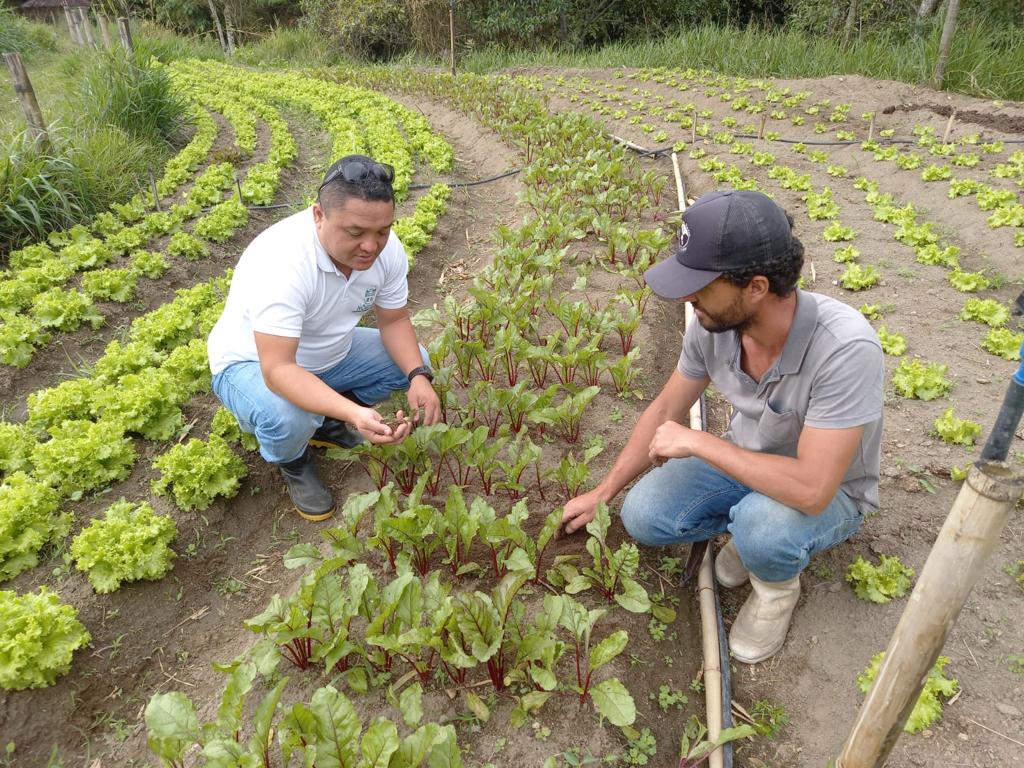Contributing to expanding access to the Our Culture collection, the Norberto Odebrecht Foundation (FNO) has just launched the digital...
The Foundation’s Social Program advances in a rural community in Rio de Janeiro
DATE: 09/14/2023
The social transformation generated by the PDCIS, an initiative coordinated by the Norberto Odebrecht Foundation, continues in the Sana community in Macaé (RJ). Since last year, in partnership with Ocyan, family farmers in the region have been supported by the Foundation and its partners to improve the productivity and sustainability of their plantations. And in recent months, a new phase of this work has begun: the practice of Socio-Productive Organization, the aim of which is to train producers in the planning, management, disposal and marketing of their agricultural crops.
The training meetings are covering the management of crops such as bananas, yams, coffee, cassava and vegetables – which the farmers in the Sana community are already used to. But with a difference: technical support for more sustainable and efficient management of rural properties. “We want to motivate producers to work with crops they already have aptitude for, but in a different, better planting format. And they are very receptive not only to learning, but to sharing their knowledge with us,” says Samuel Kumiya, the consultant supporting the Foundation in implementing the initiative.

“Our goal is always to give the people we serve the tools they need for their own growth and transformation,” says Cláudia Pimentel, Sustainability and Partnerships coordinator at the Norberto Odebrecht Foundation. In the photo, consultant Samuel Kumiya with one of the farmers who benefited.
In a partnership between the Foundation and the National Rural Apprenticeship Service (SENAR), the farmers also received a practical and theoretical course focused on banana cultivation. The classes, which covered more than 20 hours of knowledge, covered cultivation techniques, disease detection, planting, cleaning, packaging and transportation for the species.
For Júlio Cesar Muller, one of the supported producers, the actions are giving the community more hope. “We were very excited about the technician coming to accompany us on the farms, since the lack of technical assistance is one of our biggest problems. And we’re even more anxious about the expected arrival of inputs to support us in the new plantings. We can only thank Ocyan, the Foundation and APPAC-Tororó,” he said.
Strengthening
All PDCIS actions in the Sana community are being implemented in dialogue with the Association for the Protection of Environmental and Cultural Heritage (APPAC-Tororó), a local NGO partner in the initiative, and the Sana Family Agriculture Producers Association (APAF-Sana), which represents the producers who will benefit from the initiative. And in August, in addition to carrying out the Socio-Productive Organization practice, the Norberto Odebrecht Foundation (FNO) and its partners are planning their next actions. One of the initiatives that will soon be implemented is the so-called Educational-Productive Projects, or PEPs, which seek to implement new productive areas to generate income and increase the productive capacity of the target public.
During the visits to the community, the FNO team has continued the transfer of technology with APPAC-Tororó, training members of the NGO in the processes needed to plan and implement the PEPs with the target public: not only sharing the step-by-step process for executing the Educational-Productive Projects, but also helping to improve the processes for rendering accounts and executing the budget.
Through workshops and exchanges of knowledge with members of the Foundation’s Compliance area, the institution has become better able to deal with the flow of resources and inputs needed to carry out the PEPs, since the project provides for farmers to receive seedlings, fertilizers and other materials to create the new crops, in a kind of seed investment (find out more about the PEPs here!). For Márcio Nascimento, who heads APPAC-Tororó, these actions have contributed to the successful development of the planned activities. “We are getting to know a series of elements that will help us to efficiently manage all the actions to be operationalized from now on,” he said.
Transformation
According to Claudia Pimentel, Sustainability and Partnerships coordinator at the Norberto Odebrecht Foundation, the support for each of the 100 or so people benefiting from the PDCIS in Sana will reverberate throughout the community. “Our aim is always to give the people we serve the tools they need for their own growth and transformation,” she says. “And implementing the PDCIS in Sana, with the support of Ocyan and other partners, is another opportunity to show the potential of our social technology to boost this protagonism in different contexts. By encouraging family farming, we are promoting socio-productive inclusion, the fight against poverty, food security, social mobilization and much more,” he explains.



No comments